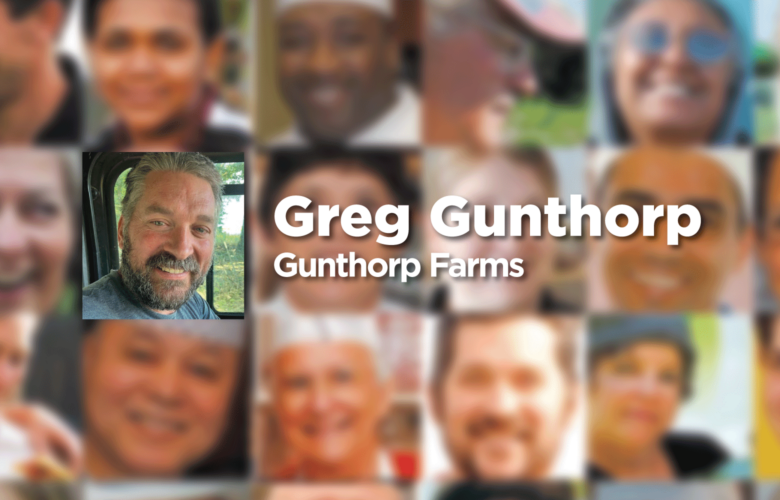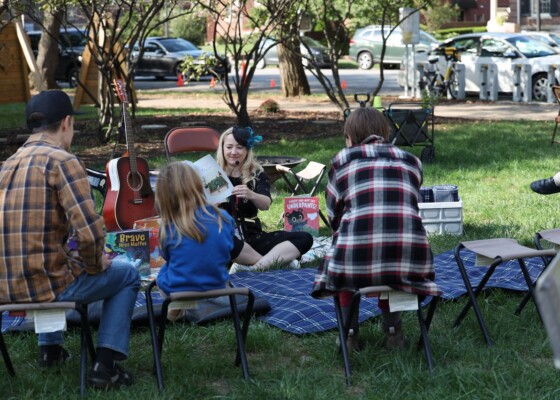Food for Thought: Denise Greer Jamerson
November 26, 2024This essay appears as part of Food for Thought: An Indiana Harvest. Read more about why we are revisiting this theme and learn more from the author, David Hoppe. Follow…
This essay appears as part of Food for Thought: An Indiana Harvest. Read more about why we are revisiting this theme and learn more from the author, David Hoppe.
Follow Old State Road 65 round a bend near Princeton and you come upon the Legacy Taste of the Garden produce stand and a living link to the history of Black agriculture in Indiana. This is where Denise Greer, her husband John Jamerson and their son DeAnthony have dedicated themselves to building upon the history of Lyles Station, an historic Black farming community with roots dating back to before the Civil War.
Denise’s father, Norman Greer, represents the fifth generation to continually farm land that’s been in their family since 1855, a legacy recognized with an exhibit in the Smithsonian African American Museum of History and Culture in Washington, D.C.
This legacy is not only reflected in the farmstand’s name, but through a variety of initiatives and projects Denise, John and DeAnthony have undertaken with regional, statewide and even national reach. Together, they have worked to improve the distribution of fresh produce from farms run by people of color to inner city food deserts, helped set up community gardens and connected other Black farmers to vital state and national resources. Their annual Indiana Black Loam Conference has introduced BIPOC (Black Indigenous and People of Color) and other socially disadvantaged, rural, urban and community farmers, producers and growers to USDA programs, loans grants, scholarships and sustainable agriculture practices. As it says on the back of John Jamerson’s t-shirt, this family has, “Put the culture back in agriculture.” Denise greeted us on a sweltering summer afternoon.
My family — the Greer family — originated from Levi Greer, a white man who came here with his mistress and their kids. He bequested the land to them in his will after he passed.
It was a settlement back then. Later is when it became Lyles Station, when Joshua Lyles donated land to the railroad.
My family’s always been here and the land is recognized by the Smithsonian as an 1855 homestead. My great great grandfather left 40 acres to each one of his kids. My father still farms that land. Even though it may not be worth millions of dollars, it’s still empowerment. It’s a connection to the place and to the people. And Lyles Station, where we’re sitting right now, included several little settlements, a church, a post office, a sawmill and a school — which were all Black-owned.
Thomas Cole, on my dad’s maternal side, owned thousands of acres of land. So when we talk about African-Americans owning land and African-American land loss…my dad, who is 87, talks about how the last part of the land Thomas had, he lost it for a sow and nine piglets so he could feed his family.
Black farms. Everybody gets the same weather, but one farm gets help for it and the Black farm doesn’t. Or one farm gets crop insurance and the Black farm doesn’t. One farm gets subsidies and the Black farm does not. When there were floods back in the ‘20s and ‘30s, Black farmers didn’t have access to funds to rebuild and had no choice but to leave, go someplace where their families could survive.
I understand now — because I didn’t used to understand — why some people left. It was about survival. I’m not trying to be funny, but I say that the first gentrification was when we were run out of the country. You come out here and see how good other people are living. Working with the USDA, you can get a loan for equipment and not pay on the loan for a year. That helps. You can buy a house for three percent less than the market rate. That helps. But Black farmers can’t get that. No blame but white kids get to go to school for free at Purdue because they’re in 4-H programs our kids aren’t privy to. My sister and I were told we couldn’t be in the club when we were coming up and we lived on a farm! It’s getting better now, but there’s not a streamlined effort to help Black farmers.
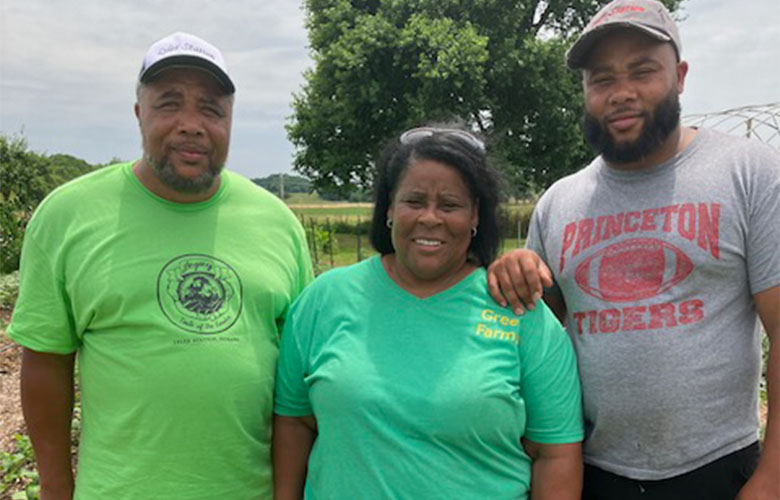
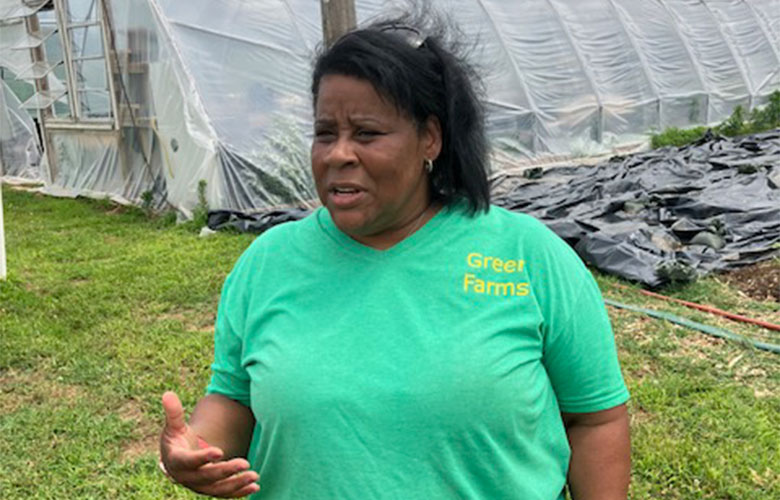
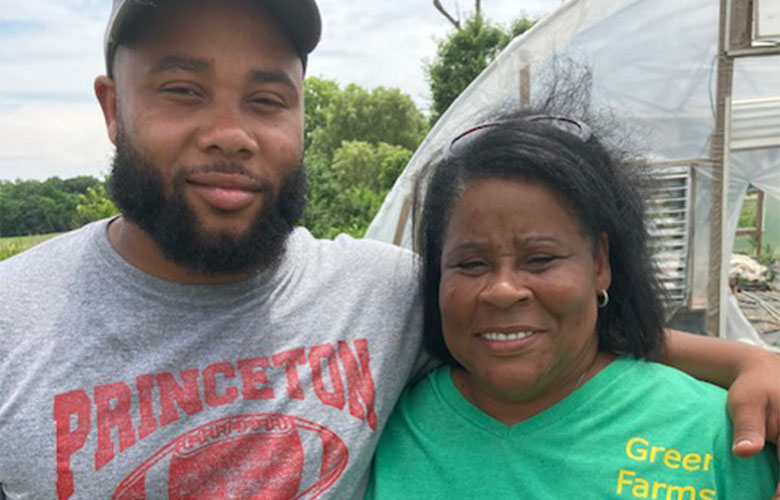
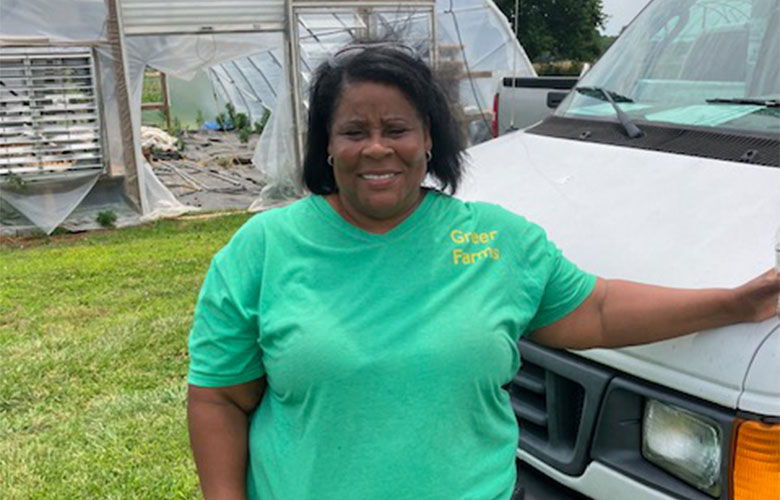
I got married, moved away and came back. Coming back allowed my kids to have a sense of community that I was brought up with. It empowers you. That’s what made my dad so resilient. It’s what he learned from farmers who worked with him as a child. They helped him and they were proud of him and saw how he was growing. As he did better, they did better.
Legacy Taste of the Garden came about when DeAnthony, my son, decided he wanted to go into produce. People love fresh produce but we came to recognize that, in Indy, there were food deserts, areas where there were no grocery stores. Yet people needed fresh food and they needed it at the right price — not like in Fishers, or at Fresh Market. Food is medicine.
DeAnthony got involved with a community garden and found out there were city kids that never even touched dirt. Which brings us into trying to teach people how to grow where they are, which brings enlightenment to inner city kids who might feel like they are out of options. But when we come in, we take them from seed to market to cooking with the food. We’ve taught them to make hot sauce!
Land down here is $20,000 an acre. That’s why it’s so important to hold on to the land you’ve got. That’s why it’s so important for me to help the people here keep the land they have. My dad, he’s working. The people around here are working. They have not had the opportunity I’ve had to tap into resources and to understand what’s really going on in farming. That’s my thing: advocacy and preservation and education. We’re working with the NRCS [Natural Resources Conservation Service — a branch of the USDA] to create a demo farm out here, with regenerative agriculture and climate-smart practices, so that people with small acreage farms can come and see how it operates.
I know that torches are being passed. The torch from my dad is going to be passed to me and my generation to figure out what’s going on. Because, like I tell my son, it’s always changing. Dad, as a kid was riding the back of a mule. Even if there is a narrative about running from the stigma of slavery, you still must understand the power that land ownership gave you. The freedom to be able to feed yourself. To be able to be your own person. That story needs to be told. How did we have a Lyles Station? How were we profitable? That story is about the benefits of agricultural living.
